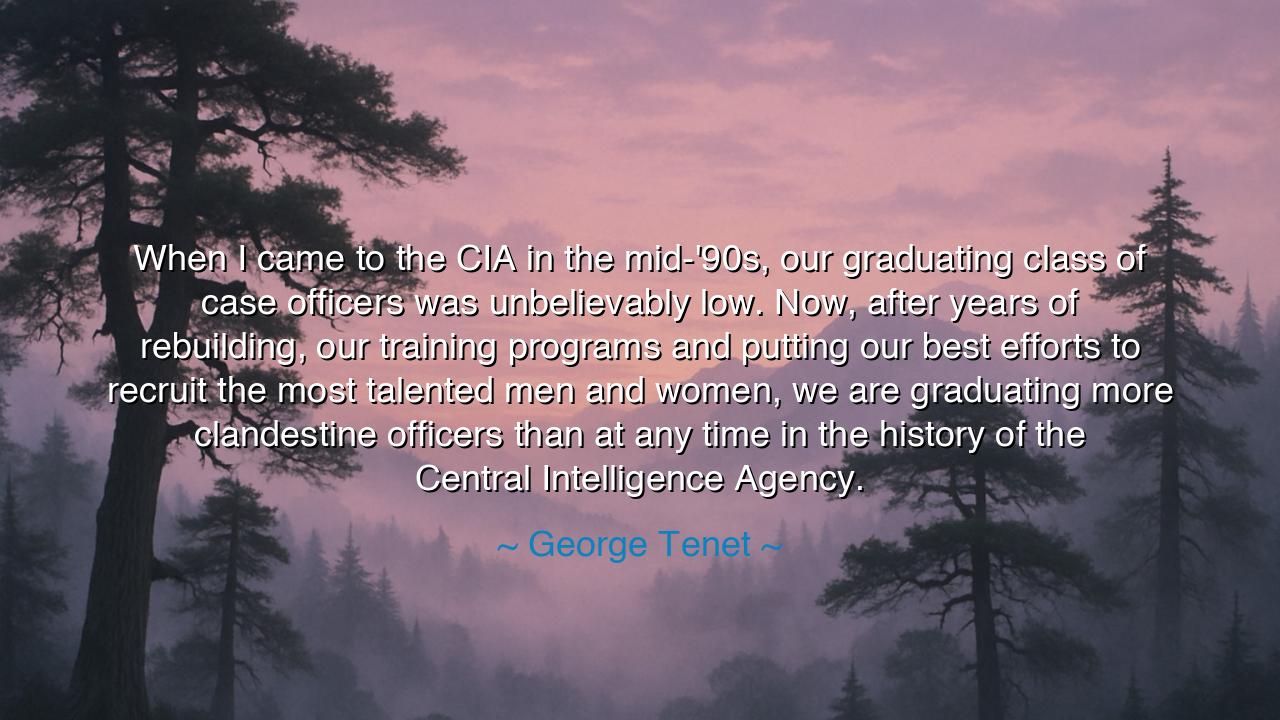
When I came to the CIA in the mid-'90s, our graduating class of
When I came to the CIA in the mid-'90s, our graduating class of case officers was unbelievably low. Now, after years of rebuilding, our training programs and putting our best efforts to recruit the most talented men and women, we are graduating more clandestine officers than at any time in the history of the Central Intelligence Agency.






The words of George Tenet, “When I came to the CIA in the mid-’90s, our graduating class of case officers was unbelievably low. Now, after years of rebuilding, our training programs and putting our best efforts to recruit the most talented men and women, we are graduating more clandestine officers than at any time in the history of the Central Intelligence Agency,” speak with the authority of one who has walked through the long valley of decline and led his people into renewal. Beneath the surface of this statement lies a story not merely of numbers or institutions, but of resilience, rebirth, and the indomitable spirit of those who labor unseen for the safety of nations. It is a lesson in leadership and perseverance, in how vision and patience can transform scarcity into strength.
When Tenet entered the halls of the Central Intelligence Agency in the mid-1990s, the world was changing in subtle yet seismic ways. The Cold War had ended, the shadow of the Soviet Union had lifted, and with it came a dangerous complacency. Many believed that espionage, that ancient art of secrecy and sacrifice, had outlived its purpose. The ranks of the case officers—those brave souls who ventured into the world to gather hidden truths—had thinned to near extinction. The agency, once the sharp spear of American intelligence, found itself dulled by neglect. Tenet’s words recall this age of quiet crisis, when the guardians of knowledge had dwindled, and the great machinery of vigilance creaked under disuse.
But he also speaks of what followed—a long and arduous rebuilding, a deliberate revival of purpose. He and those who stood with him began the sacred work of restoring what had been forgotten. They reached out across the land for men and women of courage, of intellect, of moral fiber. They sought not only spies, but servants of truth, those who could live unseen and yet serve the light. The training programs grew, the halls once empty began to echo again with the footfalls of new recruits, and the fires of discipline were rekindled. What had been small became great again, not through chance, but through faith in renewal.
This transformation is not unique to one agency or one age—it is the eternal rhythm of all human endeavor. Nations, institutions, even individuals, fall into decline when they believe their struggles are over. But those who rise again understand a deeper truth: that strength is a living thing, born of constant tending. So it was with Tenet’s CIA, and so it has been since the dawn of civilization. Consider the story of Rome after the burning of its city by the Gauls. The Romans did not yield to despair; they rebuilt stone by stone, discipline by discipline, until the empire once more stood as a fortress of endurance. Decline is not the end—it is the forge where resolve is tested and renewed.
In Tenet’s reflection, there is also a lesson in leadership. The true leader does not lament the ruins he inherits; he begins at once to build. He does not curse the scarcity of his tools, but sharpens what remains. When Tenet saw his agency weakened, he did not seek glory in speeches, but purpose in action. He invested in training, in recruitment, in the unseen foundation upon which all greatness rests: people. This is the wisdom of the ancients—the understanding that no army, no empire, no idea endures unless the hearts of those who serve it are strong and well-prepared.
The clandestine officers of the CIA, like the messengers and scouts of ancient kingdoms, work unseen but bear the weight of nations. Their courage is quiet, their triumphs often unspoken, their failures heavy with consequence. Tenet’s words, then, are not simply a report of growth—they are an homage to the unseen legion of guardians who labor in silence for the safety of others. In them we see a reflection of every generation that must train its successors, ensuring that the flame of service is never extinguished. For what is civilization, if not the endless handing down of duty from one soul to another?
And so, from these words, we draw a timeless truth: renewal is the reward of patience and purpose. Whether you build a nation, an institution, or your own character, remember that greatness is not found in sudden triumph, but in the slow, deliberate work of restoration. When your strength seems low, rebuild. When your purpose seems forgotten, rekindle it. When your faith wanes, return to the discipline that once sustained you. For the world is ever-changing, and each age must raise its own defenders—its own builders, thinkers, and seekers of truth.
Thus, let Tenet’s reflection serve as a guide for all who inherit weary hands and faded banners: do not despair in the days of scarcity, for they are the soil from which strength is reborn. Through diligence, patience, and the unwavering belief that renewal is possible, what is broken can be made whole again. So too may each of us, in our own lives, labor quietly to strengthen what has weakened, and in doing so, join the long, unbroken lineage of those who restore light where the world had begun to dim.






AAdministratorAdministrator
Welcome, honored guests. Please leave a comment, we will respond soon